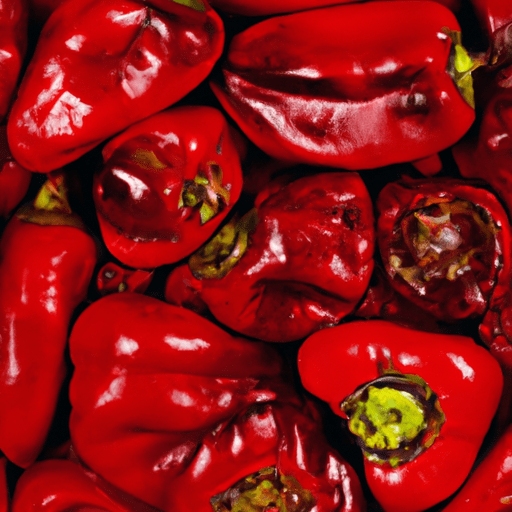Discover the Magic of Roasted Red Peppers
If you’re a food enthusiast, you know that roasted red peppers can instantly elevate any dish with their smoky, sweet, and slightly tangy flavor. These vibrant peppers pack a punch, adding depth and complexity to a wide range of culinary creations. Whether you’re a seasoned chef or a culinary novice, using roasted red peppers in your cooking will undoubtedly impress your taste buds and elevate your meals to new heights. In this blog post, we will explore the taste, common uses, nutritional value, and fascinating history of the roasted red pepper.
Unraveling the Taste Sensation
Roasted red peppers possess an exquisite taste that entices your palate and leaves you craving more. The roasting process intensifies their natural sweetness while infusing a delightful smokiness. Their vibrant red color is a feast for the eyes, hinting at the burst of flavor they offer. With a slightly tangy undertone, these peppers strike the perfect balance between sweet and savory, making them incredibly versatile in various culinary applications.
Cooking with Roasted Red Peppers
The culinary possibilities with roasted red peppers are truly endless. Their distinct flavor profile allows them to enhance a wide range of dishes, from appetizers to main courses. Here are some popular uses:
1. Appetizers and Dips
Roasted red peppers are a star ingredient in appetizers and dips. Whip up a flavorful red pepper hummus, where the roasted peppers lend their captivating taste to a creamy and smooth chickpea base. Alternatively, blend them with Greek yogurt, garlic, and herbs to create a tantalizing dip perfect for accompanying freshly sliced vegetables or pita bread.
2. Sandwiches and Wraps
Take your sandwiches and wraps to new heights by adding roasted red peppers. Whether you prefer a classic turkey and cheese sandwich or a vegetarian wrap, these peppers add a burst of flavor and a delightful crunch. Combine with your favorite ingredients for a gourmet twist!
3. Pizza and Pasta
Next time you’re making pizza or pasta, consider incorporating roasted red peppers for an extra layer of flavor. Their vibrant color will make your pizza toppings pop, while their sweet and smoky taste complements tomato sauces and creamy pasta dishes.
4. Salads
Elevate your salads by adding strips of roasted red peppers. They bring a unique texture and a burst of flavor to any salad combination. Whether tossed in a Mediterranean salad, incorporated into a grain bowl, or as a vibrant topping for your Caesar salad, roasted red peppers are sure to impress.
Health Benefits of Roasted Red Peppers
Apart from their remarkable taste, roasted red peppers offer numerous health benefits. They are low in calories and fat while being high in essential nutrients. Here are a few highlights:
- Vitamin C: These vibrant peppers are an excellent source of vitamin C, supporting a healthy immune system and promoting collagen production.
- Vitamin A: Roasted red peppers contain vitamin A, which is crucial for maintaining healthy eyes and supporting overall eye health.
- Antioxidants: Loaded with antioxidants, these peppers help protect your body from free radicals and reduce the risk of chronic diseases.
- Capsaicin: Although roasted red peppers are not spicy, they contain traces of capsaicin, a compound known for its potential anti-inflammatory properties.
The Mythical History of Roasted Red Peppers
Roasted red peppers have an intriguing history that spans across continents. While it’s challenging to trace their exact origin, they have been an integral part of cuisines for centuries. Peppers, including red ones, were first cultivated in Central and South America and were later brought to Europe by Christopher Columbus. Over time, roasted peppers became a staple ingredient in Mediterranean cuisine, particularly in Spain and Italy.
Get Roasting!
Ready to embark on a culinary adventure and experience the magic of roasted red peppers? Whether you’re cooking for a crowd or simply preparing a cozy meal at home, these peppers are sure to elevate your dishes with their unforgettable taste. From appetizers to main courses, their aromatic smokiness and sweet tang will leave you craving more. So, head to your kitchen, fire up the oven, and unlock the incredible flavors of roasted red peppers today!
Interesting Facts about Roasted Red Pepper:
Origin: Roasted red pepper is believed to have originated in the Mediterranean region, specifically in the countries of Spain, Greece, and Turkey. It has been a staple ingredient in Mediterranean cuisine for centuries.
Common Uses: Roasted red peppers are incredibly versatile and used in a variety of dishes. They add a rich, sweet, and smoky flavor to sauces, soups, dips, salads, sandwiches, and pasta dishes. They are also popular as a topping for pizzas and a filling for sandwiches and wraps.
Nutritional Benefits: Roasted red peppers are low in calories and fat, making them a healthy addition to meals. They are an excellent source of Vitamin C, providing more than twice the daily recommended amount in just one pepper. They also contain significant amounts of Vitamin A, potassium, and fiber.
Unique Properties: Roasting red peppers enhances their natural sweetness and imparts a smoky flavor. The roasting process softens the peppers, making them more tender and easier to digest. The vibrant red color of roasted peppers comes from the carotenoid pigments they contain, such as lycopene, which is a powerful antioxidant.
Historical Significance: Peppers, including red peppers, have been cultivated and consumed since ancient times. They were introduced to Europe and the rest of the world by Christopher Columbus, who brought them back from the Americas during his voyages in the late 15th century. Red peppers quickly became incorporated into the cuisines of various cultures, contributing to the diverse culinary landscape we have today.




Use the share button below if you liked it.
It makes me smile, when I see it.